Canadian Plan for the 2024 Olympics
Published on January 30th, 2019
Seventeen nations stood on the podium at the Rio 2016 Olympics, but when Canada wasn’t one of them, the national federation Sail Canada took a close look at the program. Scuttlebutt editor Craig Leweck checked in with Michael Milner, the organization’s new High Performance Director, for an update.
After the Rio 2016 Olympics, the program was overhauled. Talk us through that.
Correct. Sail Canada went through a third-party audit of how to strive and succeed with the goal of Olympic success in 2024. They reviewed our entire competitive structure, and they decided on some core changes to our system, including defining the staff, having a dedicated High Performance Director who can focus on strategy and systems, and having a National Performance Coach who’s focused on coaching technical knowledge and leading the coaching stream.
The next step was to hire the coaches to work specifically for the athletes which we are currently in the process of doing. This is all fairly fresh as I only started in May, but we’ve retained our National Performance Coach, Ken Dool, who has, I believe, eight Olympic Games experience, to help me with that knowledge. And we’re slowly now building our coaching team and our structure to allow for our athletes’ success.
But there is only so much any team can do without skilled sailors. What can be done to better prepare young people before they commit to an Olympic campaign?
This is an important part of the puzzle. What we’re trying to do is create a development system across Canada, which requires a concerted effort as we are a very big country. But by initiating a number of training opportunities across Canada, we can identify young sailors and bring them into a competitive system and ultimately into our Olympic sailing system.
In 2019, we’re hoping to have four regional events, what we call Talent ID Camps across Canada. And from those camps, top young sailors will be invited to further camps, including a training block from which a Sail Canada Youth Team will be selected.
This will be the beginning, with that Youth Team then to become integrated into the Canadian Sailing Team structure before they’re on the Canadian Sailing Team. We’re trying various methods to identify sailors younger and bring them into our competitor stream or high performance stream along with our mature athletes earlier.
Making changes to the team structure is the easy part. Developing elite sailors can take years and years. How do you manage expectations?
The good news is how Canada realized that, right now, change is needed. The world is moving. We just had one of our two-time medalists, Ross MacDonald, come in and talk to our team in which he stated, “There’s a box, and success at the Olympics is that there’s a whole series of things within a box that you have to do. But the successful nations are the ones that expand that box at each Olympics.”
That’s what we’ve got to focus on. We all know, currently, what it takes to have Olympic success. There isn’t a nation in the world that doesn’t know this, but how do we expand that box a little bit further? And every Olympics, it’s done. In every four-year cycle, there’s a new expansion. And all of us, that’s what we do. We try and find out what are those new things? What is that change that is going to make a difference in each Olympic Games? And that’s what we’re doing.
Canada has had a good reputation in the single-handed boats. What do you attribute that to?
I call that institutional history. For example, success in the Finn fleet has gone back to 1984 with Terry Neilson, so we have a lot of history and background and what I call institutional knowledge in the single-handed classes.
That’s why, for example, in the 49er class, while we’ve had some success, we don’t have that institutional knowledge that we need more of. While there are very successful skiff sailors and coaches in Canada, we brought in a European coach in the 49er class to help us move that system further forward.
This initiative is helping us to build a volume of high performance sailors. We’re really hoping that in 2020, while most of them may not go to the Olympics, they will be fostering our big leap forward through to 2024.
There was criticism within Canada for not sending a full team for the events at Rio 2016 in which the country had qualified for. Is that a situation that may occur again?
What had happened was there was an Olympic country standard to qualify for the Games, and then Canada had a higher standard the athletes had to meet than in the past Olympics. But we need to look at it differently going forward, which is my intent and now just waiting for approval from the Canadian Olympic Committee to ratify this new policy.
In general, you have to look at the situation. If we’ve got 10 Olympic teams and there’s a whole lack of them fighting for medals, then we have to focus our precious resources on where we allocate them. But right now we need to get Olympians.
We need to get that experience you can only get at the Olympics and get them back to Canada to work with other athletes so as to move the program forward. So, right now, we’re at a stage where I need those people at the Olympic Games, gaining the experience so, at the next Olympics, they can succeed. So that’s the plan we seek to implement.
It’s hardly doom and gloom for the team as Canada is at an elite level with the Laser, Radial, and Finn. That’s a big plus.
Indeed. We’re really excited about the momentum and we’re pleased to see nearly all of them coming together into training groups. By redeveloping our internal training groups of four boats, four Canadians working together towards a common goal, following the formula for success for any nation, we can take massive steps. We’re getting close.
But great ideas can die without funding.
Correct, and thankfully we’re moving forward on that level. We have had some recognition of success over the past year which has seen our funding increase slightly year over year to allow us to do a few more things.
Also, the Board of Directors at Sail Canada has recognized the direction we’re going in and has allowed us to distribute some more funds to our athletes, which is greatly appreciated. Plus there is a volunteer fundraising group at Sail Canada that’s working hard and diligently.
Overall, we are all actively doing everything possible to do what we can for our athletes to promote their success not only in 2020, but really focusing on the ultimate success of 2024.


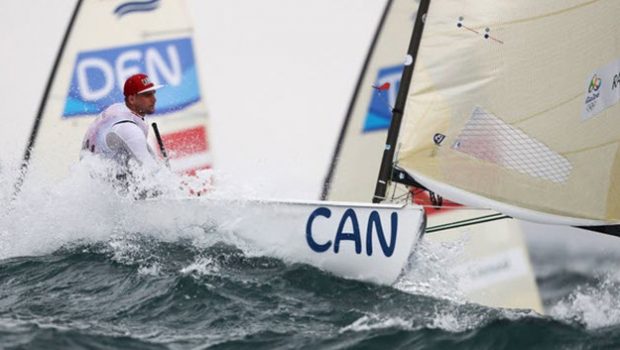
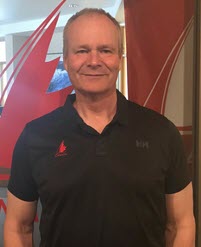


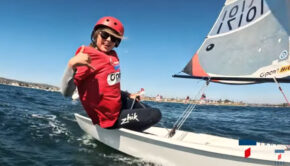
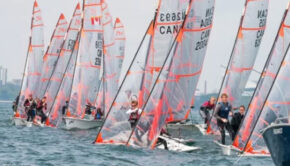
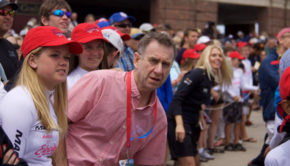

 We’ll keep your information safe.
We’ll keep your information safe.